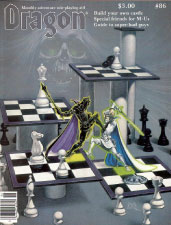 A little part of my
childhood was killed last week. The first magazine to which I
subscribed, Dragon,
will no longer be published as a magazine. It, along with Dungeon, rely on a license from Wizards of the Coast (WotC), which
Wizards is evidently eliminating.
My fond memories of pawing through the issues I got in the mail each
month (from around #70 to #125) already took one blow, when I gave the
issues to a fellow gamer during a move, content in the knowledge that I
had PDF
versions of them. Even though I haven’t read the magazine for years,
its cancellation now makes me irrationally sad.
A little part of my
childhood was killed last week. The first magazine to which I
subscribed, Dragon,
will no longer be published as a magazine. It, along with Dungeon, rely on a license from Wizards of the Coast (WotC), which
Wizards is evidently eliminating.
My fond memories of pawing through the issues I got in the mail each
month (from around #70 to #125) already took one blow, when I gave the
issues to a fellow gamer during a move, content in the knowledge that I
had PDF
versions of them. Even though I haven’t read the magazine for years,
its cancellation now makes me irrationally sad.
It is also the latest in a line of such cancellations, as Wizards appears to be attempting to pull all intellectual property rights back to itself. It chose not to renew the Dragonlance license to Weis & Hickman a couple of days ago as well. White Wolf reverted its license to Ravenloft last August. Even Code Monkey Publishing, who writes d20-related software, was refused an extension to their license last November. According to them, Wizards said this was “because of future product considerations”.
What this means is not clear. Comments from the soon-to-be-former publisher of Dragon indicate that both magazines will continue to be released electronically on the WotC site. It’s possible that Wizards is just trying to be the lone nexus of all D&D related information, much in the way that Steve Jackson Games is for their own games.
Reading the tea leaves more closely, however, suggests that Wizards, after opening the content of some of their Dungeons & Dragons product with the hugely popular Open Gaming License (OGL) and the d20 System, may be looking to close it again with their next edition. The d20 System radically altered the economic landscape of role-playing games, for better and worse, and serves as an interesting case study of open licensing in a real economy. I’m not much of a fan of the d20 system, but very much like the idea of open gaming. One interesting facet of this is that, while the OGL is not revocable, the d20 license is, which may be bad news for a lot of gaming publishers. Add to that the fact that much gaming content might not even be copyrightable, and it looks like the RPG economy is going to be shaken again in the near future.
While all this is happening, Shadowrun’s license has been sold again. The new company is (ironically, if you know the game) based in Seattle, which puts them close to FASA Interactive, a Microsoft owned company that owns the electronic rights to the game, which they are using to make a multiplayer shooter video game to be released Real Soon Now. I’m not sure the proximity will be relevant, but could be interesting. It also implies that SR will probably have a Fifth Edition before too long, even though it is the same staff as it was under WizKids.
Regardless of what games you play though, dice will likely be getting more expensive. At I-CON, I talked with one of the guys at Chessex, one of the largest dice vendors around. All of their product is made in Germany (often using machines that no one builds anymore), so they are getting nailed by the Euro-dollar exchange rate. As of this writing, buying 100€ worth of goods costs about 136USD. At the start of 2006, this same 100€ worth of goods cost only 120USD. The Chessex guy claimed they’d been resisting passing this onto the customer, but couldn’t continue doing so. This will probably make feeding my dice addiction at least 13% more painful.
So, taking all this in, I suspect role-playing, economically anyway, will get worse before it gets better, and a lot of gaming companies (and probably retailers as well) are going to get nuked. At the same time, however, companies like Drive-Thru RPG, which sells watermarked (but non-DRM) versions of role-playing products in PDF format, seem to be gaining steam and micro publishers based around electronic publishing seem to be springing up all over. Many products from these authors are extremely innovative, either thematically, mechanically, or both. I suspect that, within three years, most current paper RPG publishers will have either folded or been bought out, regressing us back to WotC, White Wolf, probably Steve Jackson Games, and maybe a half-dozen smaller players. At the same time, the electronically published RPG market will heat up a lot. It will also be where the cool stuff is happening, as the talented authors become more inclined to innovate once outside of the d20 realm. We might see one or two print-on-demand attempts, which will likely fail. In this environment, I expect open licenses to fade to nothing in the printed world, but catch on a little in the electronic micro-publisher world. Someone coming up with a good, open system, might be able to capitalize on the closing of d20 to build a big community of authors, if they time it right. I wish I had such as system, or a better oracle. Anyone know of good candidates?